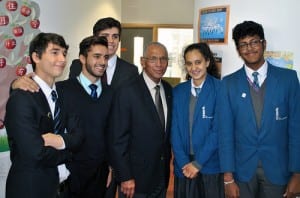Astronaut touches down in Swiss Cottage
By Oli Usher, on 10 October 2014
Charlie Bolden was born in the deep south of the US, during the days of segregation and institutionalised racism. Despite this inauspicious start in life, he went on to a high-flying military career, commanded the Space Shuttle, spent 28 days in orbit and, in 2009, was made head of NASA by President Obama. He is the first African American to hold the position.
During a trip to the UK to meet senior officials in the UK and Italian space agencies, Bolden dropped into the UCL Academy for a few hours to talk to the students and teachers there. The visit was organised by the Mullard Space Science Laboratory at UCL.
He started off with a conventional inspirational speech, full of quotable soundbites – “study hard, work hard, don’t be afraid of failure” – as well as first-hand anecdotes from the four Space Shuttle missions he flew on. (Most memorably, he went on a long and highly entertaining digression about Newton’s laws of motion, and how in microgravity you need to be attached to a computer keyboard if you want to avoid launching yourself across the cabin when you type.)
As he went on, and the students gradually became more and more enthused, more and more hands shot up in the audience.
A quarter of an hour in, any pretence of this being a lecture was off. Instead, it had become a wide-ranging conversation covering everything from what happens if someone falls ill in space (there is someone with basic surgical training on every mission) to whether or not there is wi-fi on the International Space Station (there is).
The questions came thick and fast, and so did the answers. Only one had him stumped for a few seconds: “What emotions did you feel when you first went to space,” one student asked.
“I’m an emotional guy,” he eventually replied. “I looked down and saw an island, which was Great Britain. And over the horizon, another, bigger ‘island,’ which was Africa. My forebears were from Africa, and I had memorised the map so I could identify all the countries – Ghana, Nigeria and so on. But I looked down, and I saw that from space there were no lines, no borders. And I wept, and thought about all the divisions among people.”
Things might not be as tough for the pupils of UCL Academy as they were for an African American growing up in South Carolina in the ‘40s and ‘50s, but Bolden still sees invisible barriers to students’ success. Among these are lack of confidence to aim high. Bolden recalls how he nearly never applied to be an astronaut, because he thought he didn’t stand a chance – there had never been a black man in space when Bolden joined the astronaut corps.
In particular he singled out the tyranny of low expectations that oppresses young women. “You can do anything you want to,” he told the audience: there is nothing about women’s brains that says science and engineering should be left to the men.
Watching the lecture were two UCL Academy students working towards their GCSEs in astronomy, Edvin Hedzic and Nart Sllamniku. “He engaged with the audience, he wasn’t just giving facts. It was really inspirational,” Edvin said afterwards. “I think it was the best lecture I’ve seen.”
After the lecture, Bolden toured the school with the Vice-Principal to see the facilities and talk to students and staff. As he walked along the corridors and through the classrooms, he was regularly mobbed by students asking questions and posing for selfies.
View images from the visit from UCL Mathematical & Physical Sciences on Flickr:
 Close
Close


